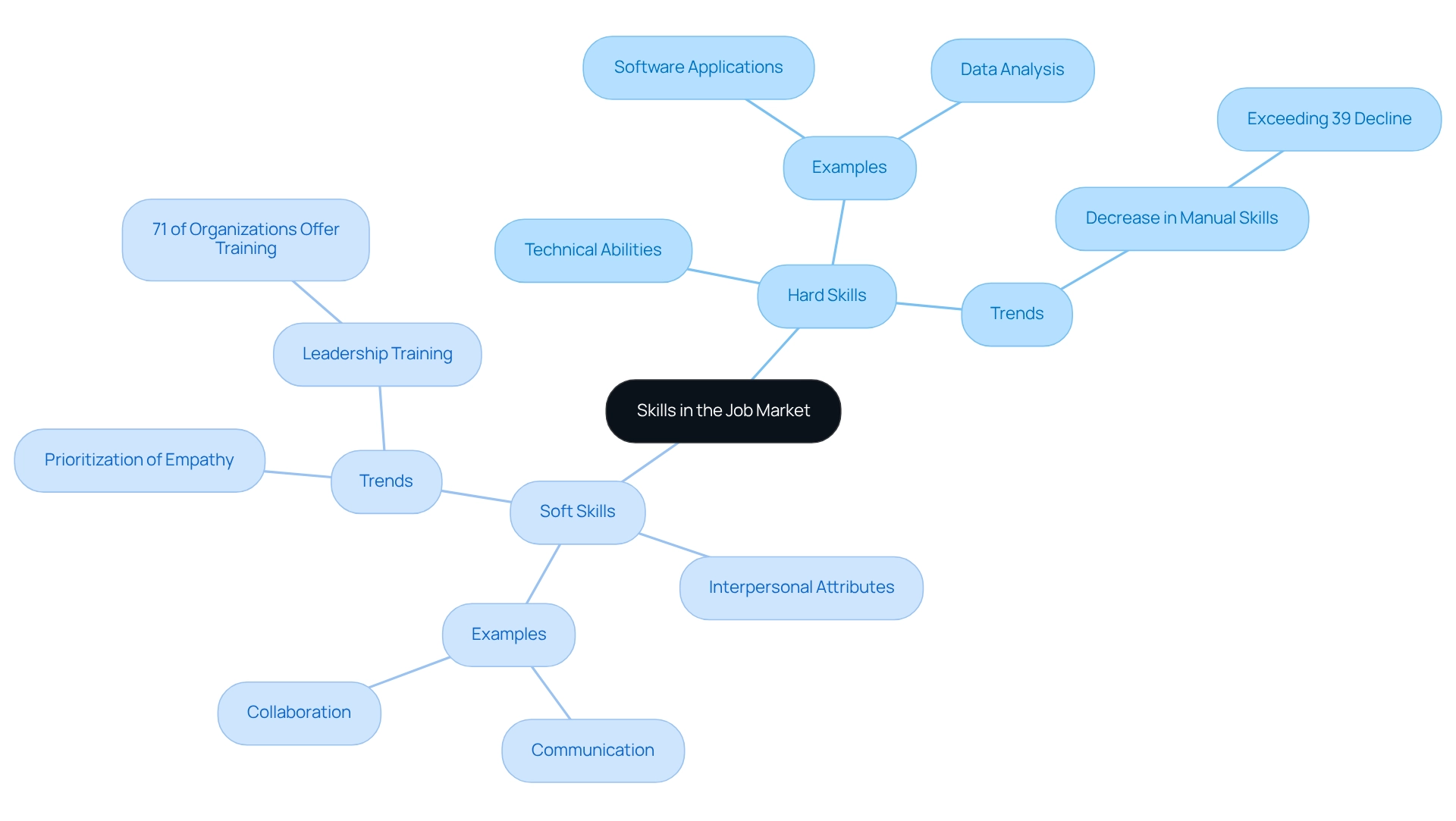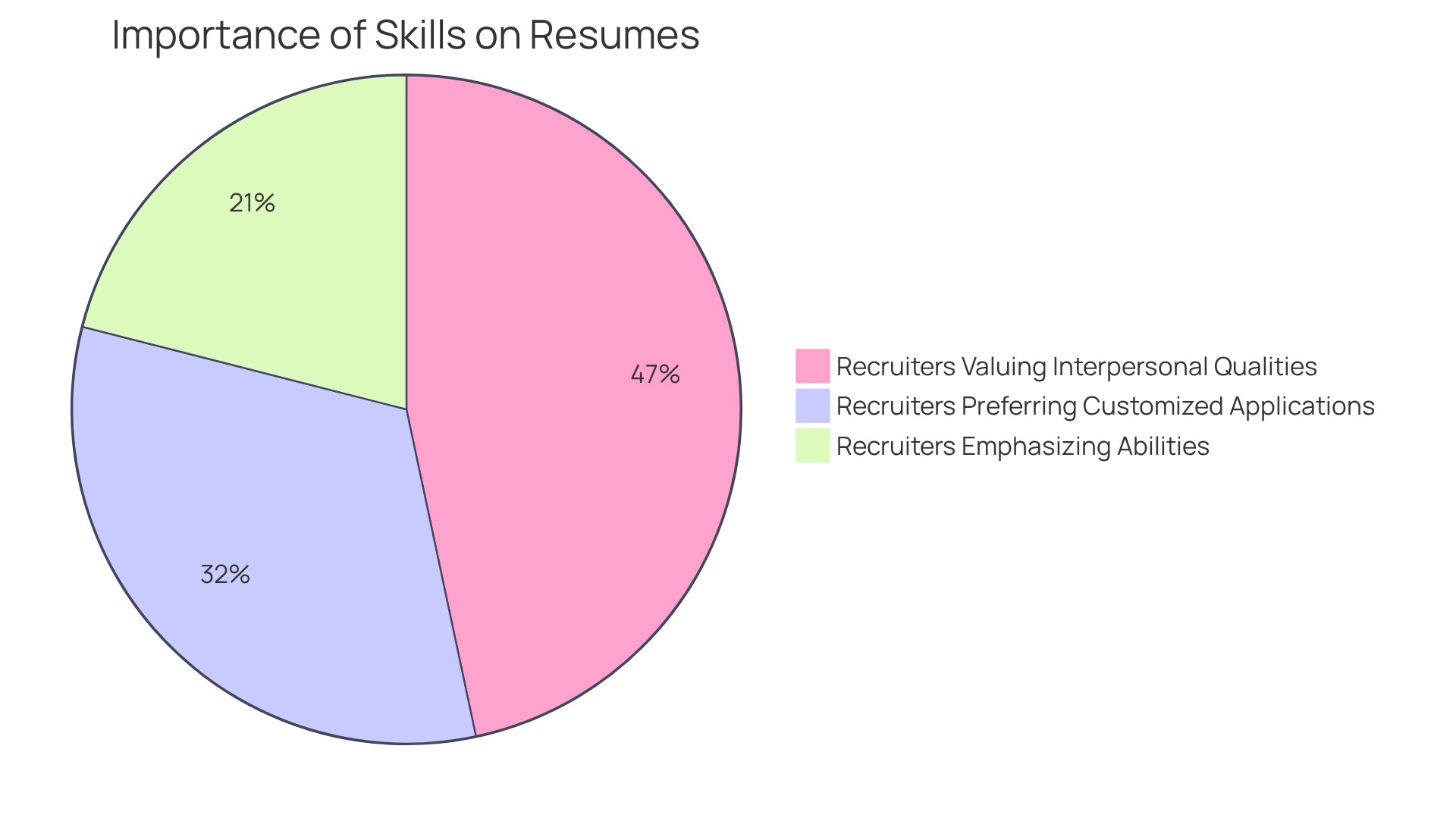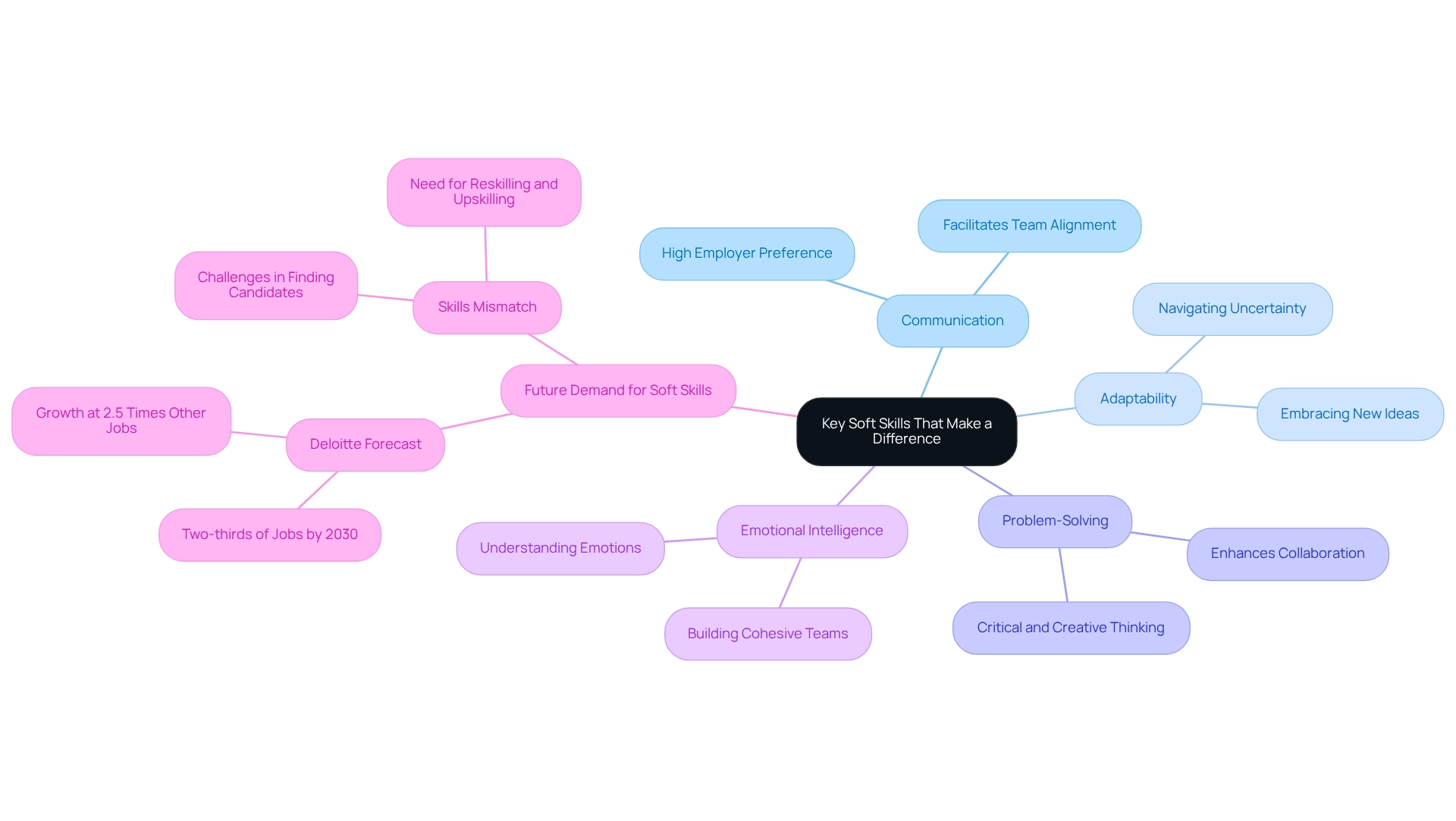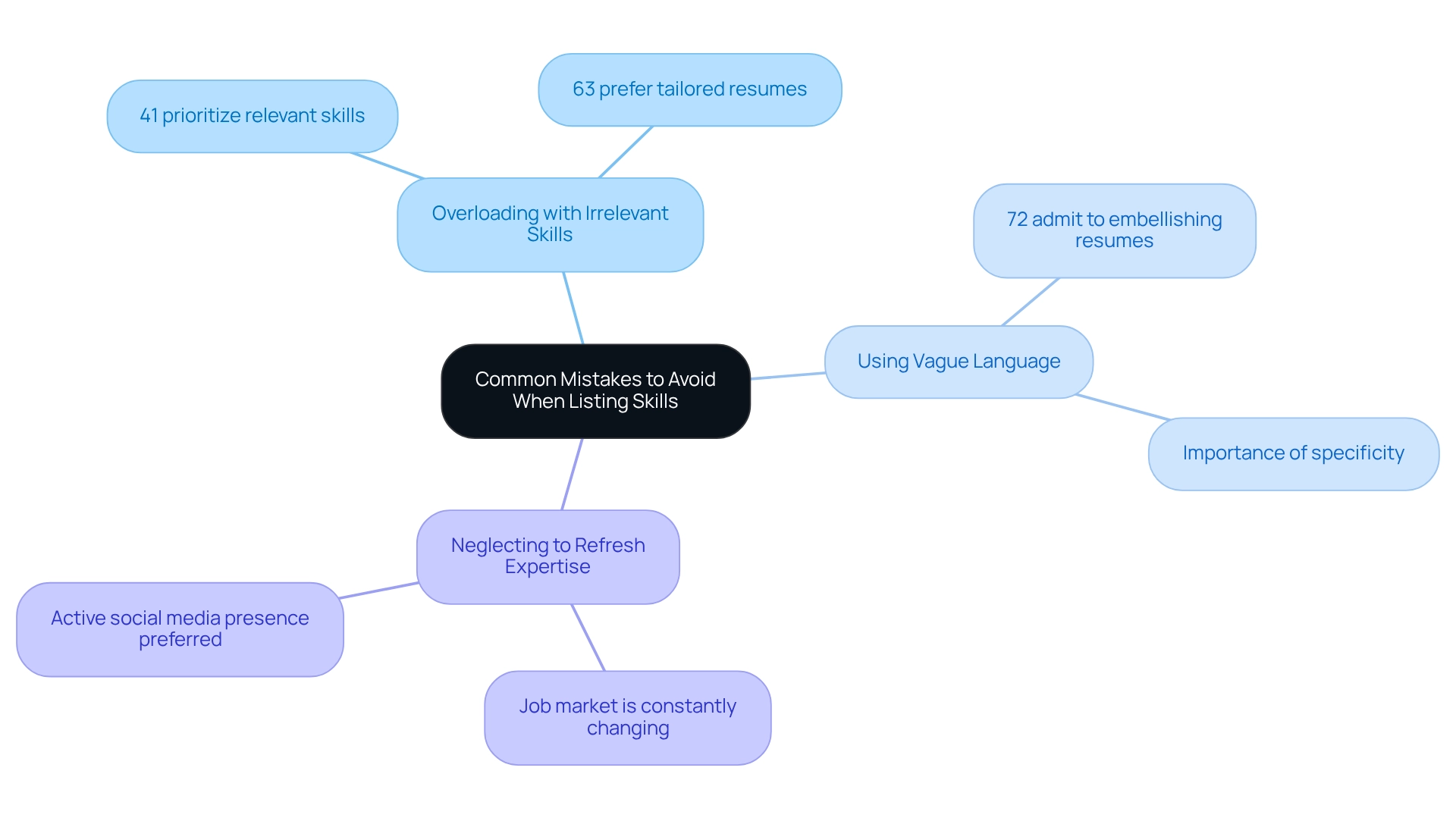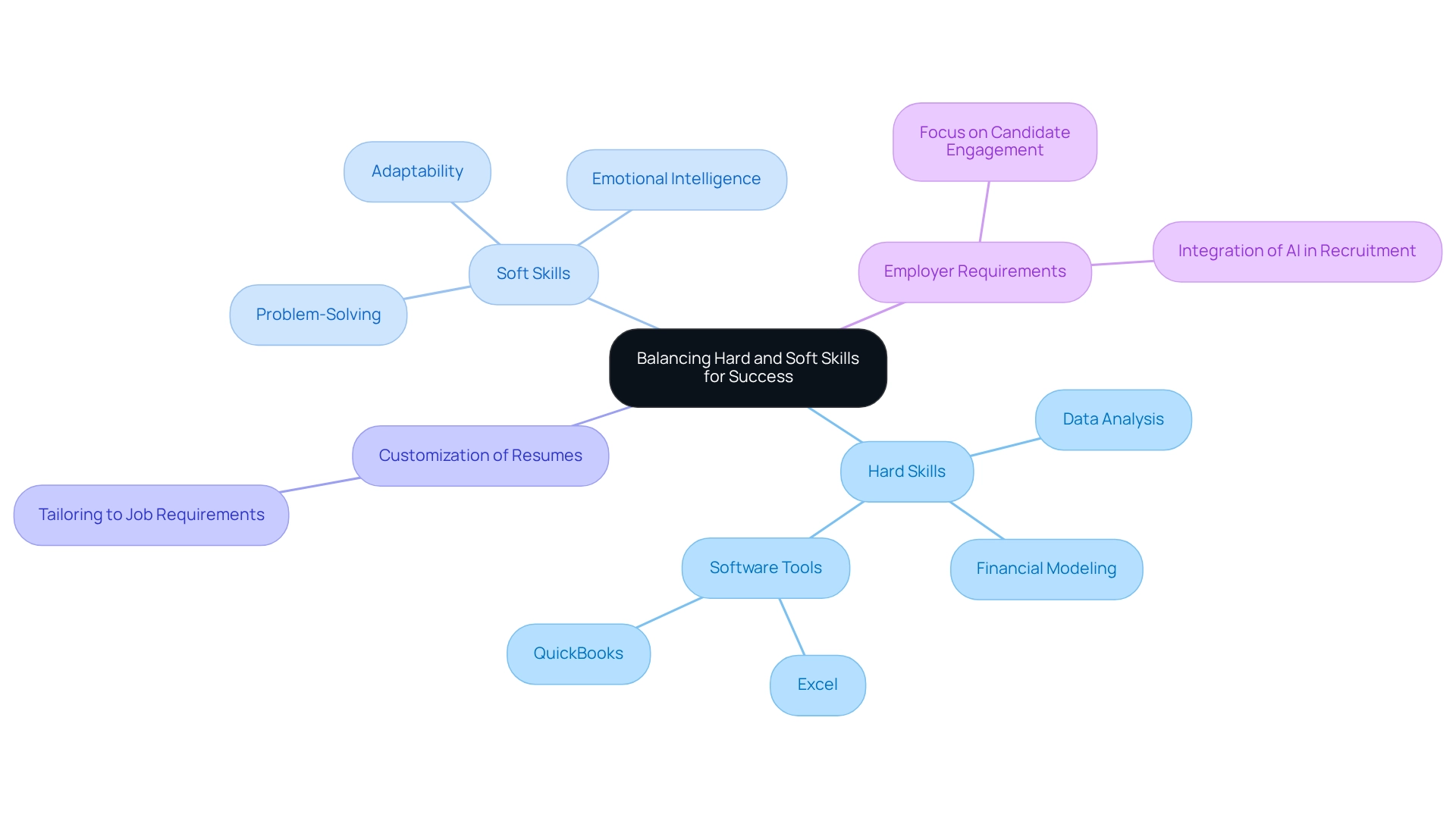Overview
The article examines the critical balance employers seek between hard skills and soft skills on resumes. Hard skills represent essential technical competencies; however, soft skills such as communication and emotional intelligence are gaining prominence. This shift is evidenced by trends indicating a decline in manual skills and an increasing focus on interpersonal abilities. Notably, 71% of organizations are now offering leadership training to cultivate these competencies. Therefore, candidates must strategically balance both skill types on their resumes to enhance their prospects for career success.
Key Highlights:
- Hard skills are specific, measurable technical competencies, while soft skills encompass interpersonal attributes that are harder to quantify.
- Recent trends show a significant decline in the need for manual skills in industries like Energy Technology and IT Services, with drops exceeding 39%.
- Employers increasingly prioritize soft skills, with empathy being recognized as the most essential attribute for managers by nearly a third of UK adults.
- Candidates should balance hard and soft skills on their resumes, as 71% of organizations offer leadership training to develop these competencies.
- 63% of recruiters prefer customized applications, with 41% emphasizing abilities over other resume components.
- Common hard skills sought by employers include data analysis, programming languages, project management, digital marketing, and technical proficiency.
- Soft skills such as communication, adaptability, problem-solving, and emotional intelligence are increasingly valued, with roles requiring these skills projected to expand significantly by 2030.
- Best practices for highlighting skills on resumes include creating a dedicated section for abilities, using specific examples, and customizing skills to match job descriptions.
- Common mistakes include overloading resumes with irrelevant skills, using vague language, and neglecting to update expertise to align with industry changes.
- A balance of hard and soft skills is crucial for career success, especially as hiring managers assess cultural fit and interpersonal abilities during interviews.
Introduction
In the dynamic landscape of today’s job market, the balance of hard and soft skills stands as a pivotal factor for career success. Employers are increasingly on the lookout for candidates who not only possess technical expertise but also excel in interpersonal abilities. Therefore, understanding how to effectively showcase these competencies on a resume is essential. The demand for a diverse skill set—ranging from data analysis and programming to communication and emotional intelligence—is at an all-time high.
This article delves into the significance of both hard and soft skills, providing insights on how candidates can tailor their resumes to highlight these attributes, avoid common pitfalls, and ultimately distinguish themselves in a competitive hiring environment. As the war for talent intensifies, mastering the art of skill presentation will be crucial for candidates aiming to navigate multiple job offers and secure their ideal positions.
Understanding Hard Skills and Soft Skills
Technical abilities are defined as specific, teachable competencies or knowledge sets that can be quantified and measured. These encompass competencies such as proficiency in software applications, data analysis, and technical expertise relevant to various industries. For instance, in fields like Energy Technology and Information Technology Services, there has been a significant decrease in the need for manual dexterity, endurance, and precision abilities, with drops surpassing 39%. This shift underscores the changing landscape of hard competencies in the job market.
Conversely, interpersonal attributes are typically more subjective and challenging to measure. These competencies include communication, collaboration, and problem-solving capabilities, which are vital for nurturing effective workplace dynamics and ensuring a suitable cultural fit within organizations. Recent trends indicate that leadership soft abilities are increasingly prioritized, with nearly a third of UK adults recognizing empathy as the most essential soft attribute for managers.
Individuals seeking to enhance their resumes must acknowledge that both technical and interpersonal abilities are essential skills for resume improvement. Employers are increasingly searching for well-rounded individuals who demonstrate a balance of these competencies. In fact, leadership training has emerged as the most common career development practice, with 71% of organizations offering such programs to cultivate these essential skills.
As competition for talent intensifies, candidates must not only display their abilities but also manage various job offers efficiently, ensuring they find the right match.
Successful companies such as Zillow and Amazon exemplify the significance of integrating both technical and interpersonal abilities into their hiring practices. These organizations have aligned their career development strategies with business objectives, resulting in enhanced employee engagement and talent retention. As Sam Ayoko, a System Engineer at Asana, notes, “I work on a variety of projects and tasks outside of the Help Desk. In order to remain accountable, I personally attempt to leave an update on every task that is due on that day.” This statement highlights the practical application of interpersonal abilities in effectively managing responsibilities. As the job market continues to evolve in 2025, understanding the relationship between hard and soft skills will be crucial for both job seekers and employers aiming to make informed hiring decisions.
Moreover, a smooth interview process is vital for attracting top prospects, as they evaluate potential employers just as much as they are assessed. Candidates should remain vigilant for potential red flags during interviews, such as unclear job expectations or a lack of engagement from interviewers, which may indicate a misalignment with their career goals. At Boutique Recruiting, we recognize the importance of addressing these concerns to attract and retain top talent.
The Importance of Skills on Your Resume
Common skills for a resume are a fundamental component of any CV, serving as a concise reference for hiring managers to assess a candidate’s qualifications. In 2025, the importance of expertise has only increased, with 63% of recruiters preferring applications customized for specific job roles. This customization is essential, as 41% of recruiters emphasize abilities over other document components, and an astonishing 91% value the addition of interpersonal qualities.
Employers are increasingly depending on Applicant Tracking Systems (ATS) to sift through applications based on the abilities mentioned. Consequently, integrating both pertinent hard and soft skills, which are common skills for a resume, can significantly enhance a candidate’s visibility and appeal to prospective employers. In fact, the typical curriculum vitae now enumerates 15 common skills for a resume, which is an increase from 13 in 2023, with experts in technology and marketing averaging 18 and 14 competencies, respectively.
This trend highlights the significance of demonstrating a varied range of abilities, including the common skills for a resume, as shown by a software engineer’s record of 232 competencies listed. Significantly, 67% of employers also utilize social media to assess applicants, further underscoring the diverse strategy for evaluating competencies in the recruitment process.
The importance of common skills for a resume goes beyond simple visibility; they indicate an applicant’s capacity to efficiently execute job tasks and adapt to workplace challenges. Hiring managers acknowledge this, with many highlighting that abilities are crucial in their decision-making process. For example, Ayesha Noor, a content marketer, emphasizes that 53% of job seekers are the stars of their own video presentations, showcasing innovative methods individuals are demonstrating their abilities and adjusting to contemporary hiring practices.
As companies progressively implement ATS for abilities-based hiring, comprehending how these systems assess competencies becomes crucial. This understanding enables applicants to create documents that not only fulfill the technical criteria of the position but also align with the organizational culture. Ultimately, the strategic addition of common skills for a resume is not merely about fulfilling ATS requirements; it is also about positioning oneself as a well-rounded applicant prepared to handle the challenges of the contemporary workplace.
Top Hard Skills Employers Look For
In 2025, employers are increasingly prioritizing expertise that aligns with technological advancements and the specific demands of their industries. The following key hard skills are essential for candidates looking to stand out:
- Data Analysis: Proficiency in tools such as Excel, SQL, and data visualization software is critical, as organizations seek individuals who can interpret complex data sets to drive decision-making. Statistics show a notable increase in demand for data analysis expertise, reflecting the expanding dependence on data-driven strategies across sectors. Notably, 231 partners can utilize this purpose to measure advertising performance, underscoring the importance of data analysis in various business contexts.
- Programming Languages: Knowledge of programming languages such as Python, Java, and R is essential, as these fall under the common skills for resume, especially in technology positions where coding skills can distinguish applicants. As the tech landscape evolves, these skills are becoming foundational for many positions.
- Project Management: Familiarity with project management methodologies, such as Agile, and tools like Trello or Asana are considered common skills for resume that are increasingly sought after. Employers value applicants who can effectively manage projects and collaborate within teams to achieve organizational goals.
- Digital Marketing: Common skills for resume that are crucial for marketing positions include search engine optimization (SEO), pay-per-click (PPC) advertising, and social media analytics. As businesses continue to shift towards digital platforms, expertise in these areas is essential for driving engagement and growth.
- Technical Proficiency: Understanding industry-specific software, such as CAD for engineering roles or customer relationship management (CRM) systems for sales positions, is one of the common skills for resume. Employers are seeking individuals who can seamlessly integrate into their operational frameworks.
The demand for these technical abilities is not only a reflection of current industry trends but also a response to the rapid pace of technological change. As organizations adjust to new tools and methodologies, individuals possessing these skills will be better positioned to succeed in a competitive job market. Moreover, case studies emphasize the achievements of individuals who have robust data analysis and programming capabilities, demonstrating their capacity to tackle challenges and develop innovative solutions.
In this evolving landscape, creativity and innovation remain vital, enabling job seekers to approach problems from unique perspectives and embrace new ideas. As Madison Coombs aptly states, “That’s where health and wellness come in. Staying on top of your mental and physical health isn’t just about surviving—it’s about thriving.”
This comprehensive method to ability development is becoming more pertinent in the workplace. Additionally, the unique perspectives of first-generation students can enhance problem-solving and innovation, illustrating the diverse strengths candidates bring to the table. The company’s remarkable history of achievement and many content clients further bolster the credibility of these abilities in fulfilling the requirements of today’s job market.
Key Soft Skills That Make a Difference
Interpersonal abilities are paramount in cultivating a positive work atmosphere and enhancing team cooperation. As the workplace evolves, employers increasingly prioritize these competencies, recognizing their profound impact on overall productivity and employee satisfaction. Notable soft skills that are highly sought after include:
- Communication: The ability to convey information clearly and effectively is essential for ensuring that team members are aligned and informed. Statistics reveal that strong communication skills rank among the top preferences for employers, facilitating smoother operations and minimizing misunderstandings.
- Adaptability: In a rapidly changing work environment, the flexibility to adapt to new challenges is crucial. Employers value candidates who can navigate uncertainty and embrace new ideas, a necessity as industries continue to evolve.
- Problem-Solving: The capacity to analyze issues and develop effective solutions is vital in today’s complex work environments. Employers seek individuals who can think critically and creatively to address challenges, particularly in interdisciplinary roles, as these skills enhance collaboration and teamwork. Organizations that foster a culture of collaboration often prioritize these competencies in their recruitment processes, frequently observing improved morale and productivity.
- Emotional Intelligence: Understanding and regulating one’s emotions, along with those of others, enhances interpersonal interactions. Organizations are increasingly recognizing the significance of emotional intelligence in building cohesive teams and improving workplace dynamics.
The importance of these interpersonal abilities is underscored by a Deloitte forecast indicating that roles requiring these skills will account for two-thirds of all jobs by 2030, expanding at 2.5 times the pace of positions in other fields. This shift highlights the necessity for applicants to cultivate these skills to remain competitive in the job market. Notably, persistence is the least requested soft attribute, with only 1.6% demand, contrasting with the greater emphasis on other soft skills.
Moreover, a recent study on mismatched abilities in the labor market reveals that employers face significant challenges in finding candidates who possess these essential soft skills. This gap is particularly pronounced in roles demanding interdisciplinary collaboration and innovation, emphasizing the need for ongoing reskilling and upskilling efforts. The research illustrates that as technological advancements transform job functions, the demand for interpersonal abilities continues to rise.
Organizations such as Google and Microsoft have begun to prioritize emotional intelligence in their recruitment processes, acknowledging that individuals who excel in these competencies contribute to a more dynamic and efficient workplace. As the demand for these abilities grows, applicants must ensure their profiles reflect not only their technical competencies but also the interpersonal skills that underscore their proficiency in these critical areas.
How to Highlight Skills on Your Resume
To effectively showcase abilities on a resume, applicants should adopt several best practices:
- Create a Dedicated Abilities Section: Establish a separate section for both hard and soft competencies, ensuring they are easily visible to recruiters. This method enables hiring managers to swiftly evaluate a person’s qualifications.
- Use Specific Examples: Incorporate quantifiable achievements that demonstrate the application of abilities in previous roles. For example, rather than just mentioning ‘project management abilities,’ a candidate could express, ‘Successfully guided a team of five to finish a project two weeks early, achieving a 15% reduction in costs.’
- Customize Abilities to Job Descriptions: Match abilities with the specific requirements of the position being applied for. Using keywords from the job listing not only shows relevance but also aids in navigating Applicant Tracking Systems (ATS) that many firms employ.
- Include Abilities Throughout the Resume: Highlight pertinent abilities in the summary, work experience, and cover letter to emphasize their significance. This comprehensive method guarantees that abilities are not solely emphasized in one part but are integrated throughout the document, improving overall effect.
Experts advise that job applicants incorporate around six to eight common skills for their resumes, focusing on those most relevant to the position. Recent trends suggest that junior and mid-level applicants are providing more detail in their profiles, while senior-level professionals are concentrating on succinct accomplishments. This shift highlights the significance of clarity and conciseness in application content, as recruiters frequently have limited time to assess each submission.
A case study on creating succinct, impactful application content emphasizes that individuals should steer clear of lengthy paragraphs and instead concentrate on effectively summarizing their experiences. This approach improves clarity and guarantees that the most essential details attract the recruiter’s focus, greatly boosting the chances of obtaining an interview.
Statistics show that 76% of applications are dismissed due to unprofessional email addresses, highlighting the necessity for individuals to present themselves professionally from the beginning. Frank Hackett, a Certified Professional Resume Writer (CPRW), emphasizes that his approach involves creating accomplishment-driven documents that balance keyword optimization with personal branding. By adhering to these best practices, individuals can craft documents that not only highlight their abilities effectively but also connect with prospective employers.
Tailoring Skills to Job Descriptions
Adapting abilities to job descriptions is an essential approach for individuals looking to differentiate themselves in a competitive job market. To effectively align their resumes with specific job requirements, candidates should consider the following strategies:
- Identify Key Skills: Carefully analyze the job listing to pinpoint essential skills that match personal qualifications. Highlighting these skills not only demonstrates suitability but also shows attention to detail.
- Use Industry-Specific Language: Incorporating terminology that resonates with the industry can significantly enhance a resume. This method not only demonstrates knowledge of the field but also assists individuals in connecting with hiring managers who are seeking specific skills.
- Focus on Relevant Experience: Candidates should emphasize past roles and achievements that directly align with the job requirements. By demonstrating how their abilities can benefit the employer, candidates can create a compelling narrative that illustrates their value.
Current trends suggest that the typical CV now includes 15 common skills for resumes, an increase from 13 in the last year. Technology and marketing experts frequently emphasize more competencies than those in retail and education. This shift underscores the growing importance of showcasing common skills for resumes that are tailored to the job at hand.
Furthermore, statistics show that 76% of applications are dismissed because of unprofessional email addresses, emphasizing the importance of having professional contact information. Notably, 55% of executive-level CVs are two pages in length, suggesting a norm that applicants should keep in mind when structuring their submissions. As applicants adjust to changing formats, such as video and TikTok profiles, they must also ensure that their skills and experiences are showcased in a way that aligns with modern hiring practices.
As Tom Jendriks notes, “Explore the latest statistics to internships with essential tips, opportunities, and success stories to launch your career.”
Incorporating these strategies not only enhances the effectiveness of a CV but also increases the likelihood of securing an interview. Recruiters stress the significance of personalizing applications for particular positions, highlighting that customized submissions greatly enhance individuals’ opportunities of being recognized in a crowded applicant pool. The trend towards video and TikTok profiles reflects changing preferences among younger job seekers, further emphasizing the need for candidates to stay current with presentation formats.
Common Mistakes to Avoid When Listing Skills
Candidates must be vigilant about common pitfalls when detailing their skills on a resume, as these can significantly impact their chances of securing an interview. Key mistakes to avoid include:
- Overloading with Irrelevant Skills: Listing skills that do not directly relate to the job can undermine the effectiveness of your qualifications. Recruiters frequently emphasize relevant abilities, with 41% stating they prioritize these initially. Customizing your skills to align with the job description is essential for making a strong impression. In fact, 63% of recruiters prefer resumes tailored to the job position, underscoring the importance of personalization. Being transparent about your relevant skills not only showcases your qualifications but also builds trust with prospective employers.
- Using Vague Language: Specificity is key. Instead of merely stating ‘good communication skills,’ applicants should illustrate how these skills were applied in previous roles. For example, detailing experiences such as leading team meetings or presenting to clients can provide concrete evidence of communication abilities. As Andrei Kurtuy, Co-Founder & Career Expert, observes, “Far too many job seekers lie on their resumes, with up to 72% of individuals admitting to it,” highlighting the necessity for honesty and clarity. Authenticity in describing your experiences can distinguish you from other candidates.
- Neglecting to Refresh Expertise: The job market is in a constant state of flux, and so are the competencies required across various industries. Candidates should routinely review and update their skills to ensure alignment with current industry standards and technologies. This not only demonstrates adaptability but also signals to potential employers that you are proactive in your professional development. Furthermore, individuals who engage on social media and maintain professional profiles can enhance their visibility and credibility in the eyes of recruiters. Being forthright about your ongoing learning and development can further emphasize your commitment to growth.
In 2025, statistics reveal that a significant number of candidates continue to make these common errors. For instance, a staggering 72% of job seekers admit to embellishing their CVs, which can lead to disqualification during the hiring process. Moreover, over 40% of recruiters express a preference for documents that are straightforward and easy to navigate, indicating that overly designed applications can be a deterrent.
A case study indicates that over 40% of recruiters are discouraged by applications with excessive design features, emphasizing the importance of simplicity and readability.
To enhance the impact of a CV, applicants should focus on clearly and succinctly showcasing relevant skills. This approach not only improves readability but also increases the likelihood of capturing the attention of hiring managers, who appreciate resumes that reflect an applicant’s genuine abilities and suitability for the position. Additionally, candidates should be transparent regarding their work style preferences and salary expectations, outlining their desired work arrangements, such as remote or hybrid options.
Remember, presenting your authentic self, including your motivations and personal insights, is a powerful strategy that can leave a lasting impression.
Balancing Hard and Soft Skills for Success
Achieving a balance between technical and interpersonal abilities is crucial for career progression in today’s competitive employment landscape, particularly as individuals navigate various job offers. Candidates should focus on the following key areas:
- Demonstrate Technical Proficiency: It is vital to showcase hard skills that are directly relevant to job performance. For example, in finance, expertise in data analysis, financial modeling, and software tools such as Excel or QuickBooks can distinguish applicants. This technical expertise is particularly crucial in high-demand roles that Boutique Recruiting specializes in.
- Highlight Interpersonal Abilities: Equally important are personal attributes that enhance teamwork and communication. Skills such as adaptability, problem-solving, and emotional intelligence are increasingly valued by employers, as they contribute to a collaborative work environment. In the current talent war, candidates must also be aware that hiring managers are assessing their fit for the company culture during the interview process.
- Adjust to Employer Requirements: Different roles may necessitate varying balances of abilities. Candidates should tailor their resumes to reflect the specific requirements of the job they are applying for. For instance, a financial analyst may need to highlight analytical abilities, while a client-facing position might demand enhanced communication talents. This customized method is crucial for distinguishing oneself in a competitive environment where the top individuals are choosy about their options.
The importance of this balance is underscored by recent data showing that 66% of hiring leaders anticipate recruiters will prioritize improving applicant engagement, which often relies on interpersonal abilities. Moreover, firms that emphasize transparent communication and appealing advantages have demonstrated greater success in attracting applicants, underscoring the significance of interpersonal abilities in the hiring process. This aligns with the findings from the case study titled “Candidate Attraction Strategies,” which emphasizes that transparent communication and competitive benefits are essential for effective talent attraction.
Industry leaders emphasize that a well-rounded set of abilities is crucial for job applications. As Eric Eddy pointed out, the capacity to provide outstanding applicants swiftly and effectively is often associated with their expertise in both technical and personal abilities. Additionally, companies are increasingly integrating AI as a tool to support recruiters rather than replace them, reflecting the evolving expectations of employers in 2025.
In this context, 51% of hiring leaders expect that recruitment team turnover will be an even greater challenge, making the balance of hard and soft abilities even more essential.
In summary, candidates should strive to balance hard and soft skills effectively, as these common skills for resumes are increasingly recognized as a key factor in achieving career success, particularly in the competitive fields of finance and technology.
Conclusion
Successfully navigating today’s job market demands a strategic blend of hard and soft skills, both of which are critical to a candidate’s appeal to employers. Understanding the distinction between these skills is essential: hard skills are measurable and specific, such as data analysis and programming, while soft skills encompass interpersonal abilities like communication and teamwork. As the demand for a well-rounded skill set continues to grow, candidates must effectively showcase their competencies on their resumes, tailoring them to meet the specific requirements of each job opportunity.
Highlighting both hard and soft skills on a resume not only enhances a candidate’s visibility to recruiters but also reflects their capability to contribute meaningfully to an organization. By avoiding common pitfalls—such as listing irrelevant skills or using vague language—candidates can present a clear and compelling narrative of their qualifications. Additionally, staying updated on industry trends and regularly refreshing skills ensures that candidates remain competitive in a fast-evolving job landscape.
In conclusion, the balance of hard and soft skills is not merely a desirable trait; it is a necessity for career success in today’s competitive environment. Candidates who master the art of skill presentation and tailor their resumes to reflect both technical expertise and interpersonal strengths will stand out in the crowded job market. As the landscape continues to evolve towards skills-based hiring, embracing this duality will be crucial for securing the ideal position and thriving in one’s career.
Frequently Asked Questions
What are technical abilities?
Technical abilities are specific, teachable competencies or knowledge sets that can be quantified and measured, such as proficiency in software applications, data analysis, and technical expertise relevant to various industries.
How have the demands for technical abilities changed in certain fields?
In fields like Energy Technology and Information Technology Services, there has been a significant decrease in the need for manual dexterity, endurance, and precision abilities, with reductions exceeding 39%.
What are interpersonal attributes, and why are they important?
Interpersonal attributes are subjective competencies such as communication, collaboration, and problem-solving capabilities. They are vital for nurturing effective workplace dynamics and ensuring a suitable cultural fit within organizations.
What recent trends have emerged regarding interpersonal abilities in the workplace?
Recent trends indicate that leadership soft abilities are increasingly prioritized, with nearly a third of UK adults recognizing empathy as the most essential soft attribute for managers.
How can individuals enhance their resumes?
Individuals seeking to improve their resumes should acknowledge that both technical and interpersonal abilities are essential, as employers are looking for well-rounded candidates who demonstrate a balance of these competencies.
What is the significance of leadership training in organizations?
Leadership training has become the most common career development practice, with 71% of organizations offering such programs to cultivate essential skills.
How are successful companies integrating technical and interpersonal abilities in hiring?
Companies like Zillow and Amazon exemplify the integration of both technical and interpersonal abilities into their hiring practices, aligning their career development strategies with business objectives to enhance employee engagement and talent retention.
What should candidates be aware of during the interview process?
Candidates should remain vigilant for potential red flags during interviews, such as unclear job expectations or a lack of engagement from interviewers, as these may indicate a misalignment with their career goals.
What are common skills for a resume?
Common skills for a resume are fundamental components that serve as a concise reference for hiring managers to assess a candidate’s qualifications, including both hard and soft skills.
How has the importance of expertise in resumes changed by 2025?
By 2025, the importance of expertise has increased, with 63% of recruiters preferring applications customized for specific job roles and 91% valuing the addition of interpersonal qualities.
How do Applicant Tracking Systems (ATS) influence hiring?
Employers increasingly rely on Applicant Tracking Systems (ATS) to sift through applications based on the abilities mentioned, making it crucial for candidates to integrate both hard and soft skills to enhance their visibility.
What is the average number of skills listed on resumes in 2025?
The typical curriculum vitae now lists 15 common skills for a resume, an increase from 13 in 2023, with experts in technology and marketing averaging 18 and 14 competencies, respectively.
Why is it important for applicants to understand how ATS assess competencies?
Understanding how ATS assess competencies enables applicants to create documents that fulfill the technical criteria of the position while also aligning with the organizational culture, positioning themselves as well-rounded candidates.
